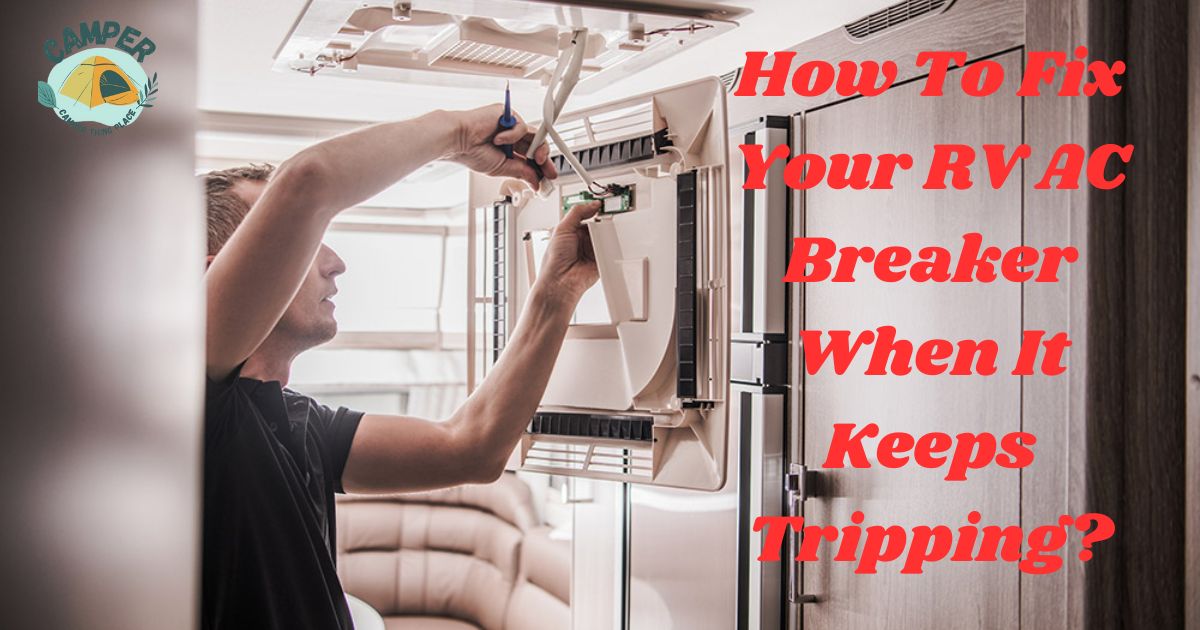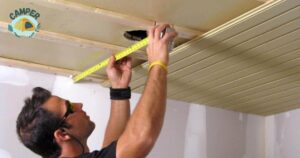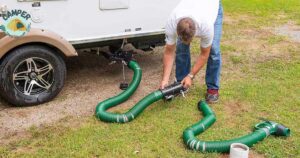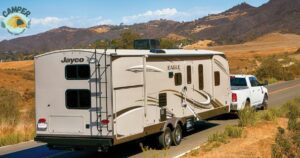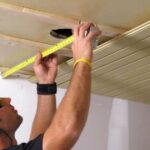An RV AC breaker is a vital component in your recreational vehicle’s electrical system. It acts as a safety switch, interrupting power flow to the air conditioning unit in case of overload or electrical issues. Think of it as a guardian ensuring a cool and worry-free journey on the road.
If your RV AC breaker keeps tripping, and you are thinking about how to fix your RV AC breaker don’t panic. To fix it, start by turning off the AC and locating the breaker panel. Check for any loose wires or signs of overheating. If the issue persists, it might be a sign of a more significant problem, and seeking professional help is advisable. Remember, safety first on your RV adventures.
If your RV AC breaker keeps tripping, here’s a simple guide to help you fix it. First, turn off the AC unit and locate the breaker panel. Identify the tripped breaker, switch it off, then back on. If the issue persists, check for any visible damage to the wiring or the AC unit itself. If you’re unsure, it’s always best to consult a professional to ensure a safe and effective solution.
Reasons an RV AC Can Trip a Breaker
RV AC units may trip breakers for various reasons. One common cause is electrical overload when multiple appliances draw too much power simultaneously.
Additionally, a faulty capacitor or compressor can lead to increased power consumption, triggering the breaker. Poor wiring, damaged cords, or a low-power campground hookup may also contribute to breaker trips.
Regular maintenance, proper electrical connections, and avoiding simultaneous high-power usage can help prevent these issues and keep your RV AC running smoothly. Here we discussed some reasons :
Overloaded Breaker
An overloaded breaker is a common culprit for electrical issues in RVs. It occurs when the electricity demand surpasses the breaker’s capacity. This can happen if too many appliances are running simultaneously, such as the air conditioner, microwave, and refrigerator.
To resolve this, redistribute the load by turning off some appliances or consider upgrading to a higher-amperage circuit breaker if it’s a recurring problem. Keeping an eye on the power demand helps ensure a well-balanced and interruption-free electrical system in your RV.
Dirty Air Conditioner
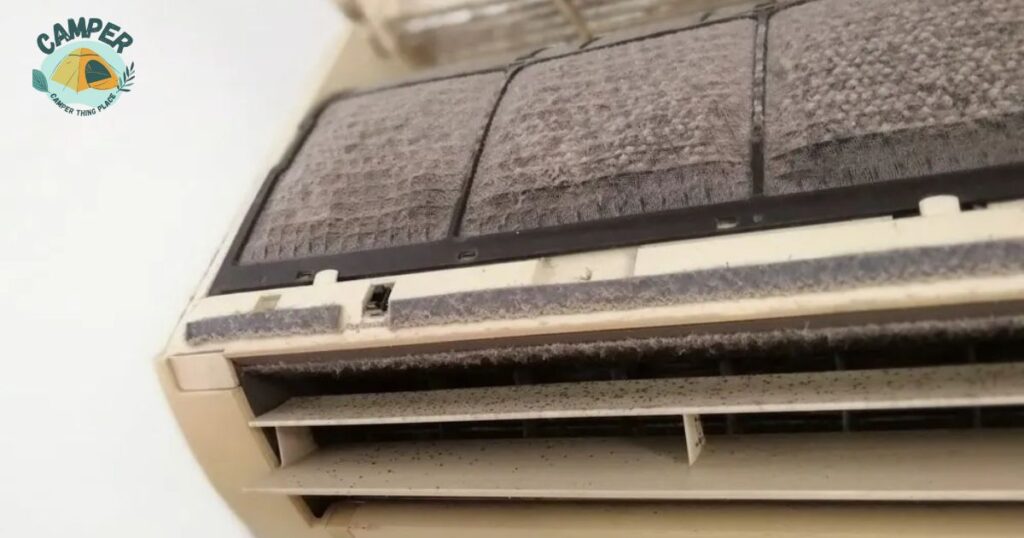
A dirty air conditioner can contribute to breaker trips in RVs. When the AC unit’s filters, coils, or fins become clogged with dust and debris, it hinders proper airflow, causing the system to work harder and draw more power.
This increased load can lead to breaker tripping. Regularly clean and maintain your RV’s air conditioner by replacing or cleaning filters.
Clear debris around the unit, and schedule professional maintenance when needed. A well-maintained AC not only improves efficiency but also helps prevent electrical disruptions.
AC Exterior
The exterior of your RV’s air conditioning unit plays a crucial role in its performance. Ensuring it is clean and free from debris is essential for efficient operation. Regularly inspect and clear any leaves, dirt, or other obstructions around the exterior unit.
This helps maintain proper airflow, preventing strain on the system and potential breaker trips. Additionally, check for any visible damage or wear on the exterior components and address issues promptly to keep your RV’s AC running smoothly during your travels.
Air filter
The air filter in your RV’s air conditioning system is a small but significant component. It works to trap dust, debris, and other particles, preventing them from entering the AC unit.
A dirty or clogged air filter can lead to reduced airflow, causing the AC to work harder and potentially trip the breaker. To avoid this, inspect the air filter regularly and clean or replace it as needed.
This simple maintenance task not only ensures better air quality inside your RV but also promotes optimal AC performance, reducing the risk of electrical issues.
Condenser Coils
Condenser coils in your RV’s air conditioning system play a crucial role in the cooling process. These coils release heat absorbed from the indoor air outside, allowing the refrigerant to cool down and circulate again.
Over time, condenser coils can accumulate dirt and debris, hindering heat exchange efficiency. When the coils are dirty, the AC system works harder, drawing more power and potentially causing the breaker to trip.
Regularly clean the condenser coils, either by gently brushing off debris or using a specialized coil cleaner. This simple maintenance step helps ensure optimal AC performance and reduces the risk of electrical disruptions.
AC Compressor Issues
Issues with the AC compressor can be a common cause of breaker trips in RV air conditioning systems. The compressor is responsible for pressurizing the refrigerant, and if it malfunctions or becomes faulty.
It may draw excessive electrical power, leading to a breaker trip. Signs of compressor issues include unusual noises, reduced cooling efficiency, or frequent cycling. If you suspect compressor problems, it’s advisable to consult a professional technician for inspection and repair.
Timely attention to AC compressor issues not only prevents electrical disruptions but also helps maintain a comfortable and cool environment in your RV.
Blown AC Fuse
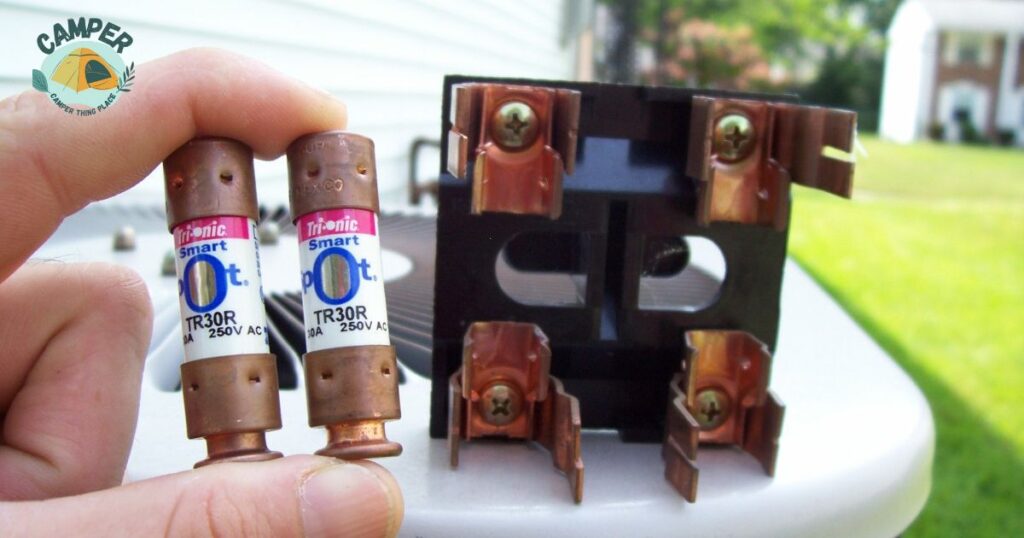
A blown AC fuse in your RV can disrupt your cooling comfort. When the fuse connected to the RV AC breaker blows, it interrupts the electrical circuit, causing the air conditioner to stop working.
This can happen due to various factors, including electrical overloads, faulty wiring, or a damaged AC unit. To address a blown AC fuse or when you need to install RV hookups, first, locate the fuse box, identify the blown fuse, and replace it with one of the same amperage.
If the issue persists, consult a professional to inspect the RV AC breaker and the overall electrical system for a comprehensive solution to keep your RV cool on your travels.
Grounded Compressor
A grounded compressor in your RV’s air conditioning system can pose a challenge to the overall functionality. When the compressor becomes grounded, it may cause electrical issues, including the tripping of the RV AC breaker.
This occurs when the compressor motor windings connect to the ground, creating a short circuit. If you suspect a grounded compressor, it’s crucial to seek professional assistance.
A technician can assess the extent of the issue, possibly recommending compressor replacement or repairs. Addressing a grounded compressor promptly ensures the smooth operation of your RV’s AC system and minimizes the risk of electrical disruptions such as breaker trips.
Short-Circuited AC Motor
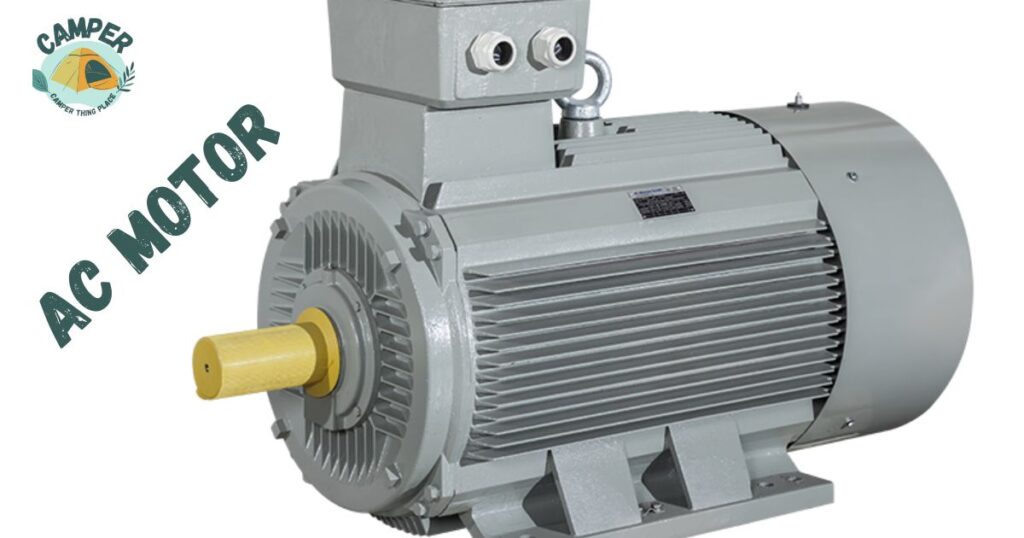
A short-circuited AC motor in your RV’s air conditioning unit can lead to unexpected electrical problems, potentially causing the RV AC breaker to trip. This occurs when there is an accidental connection between the motor’s conductors.
If you suspect a short-circuited AC motor, it’s crucial to turn off the AC unit immediately and seek professional assistance. A trained technician can inspect the motor, identify the source of the short circuit, and recommend appropriate repairs or replacements.
Timely attention to a short-circuited AC motor helps ensure the safe and efficient operation of your RV’s air conditioning system.
Damaged or Faulty Capacitor
A damaged or faulty capacitor in your RV’s air conditioning system can be a culprit behind electrical disruptions like the tripping of the RV AC breaker. The capacitor plays a vital role in providing the initial jolt of electricity to start the motor.
If the capacitor malfunctions, it may draw excessive power, causing the breaker to trip as a safety measure. Signs of a faulty capacitor include difficulty starting the AC unit, irregular motor operation, or unusual noises.
To address this issue, consult a professional technician who can assess the capacitor’s condition and replace it if necessary. Ensuring a properly functioning capacitor contributes to the overall reliability of your RV’s air conditioning system, minimizing the risk of electrical interruptions.
Broken Circuit Breaker
A malfunctioning catalytic converter can have a significant impact on your RV’s air conditioning system, as a broken circuit breaker poses a serious threat to the overall electrical stability. If the breaker is damaged, it may fail to effectively regulate the electrical flow, leading to frequent disruptions and potential malfunctions in the RV AC system.
It is crucial to address issues with both the catalytic converter and the circuit breaker promptly to ensure the proper functioning of your RV’s air conditioning and electrical systems.
Signs of a broken circuit breaker include visible physical damage or an inability to reset. To address this issue, it’s crucial to replace the damaged breaker promptly with a new one of the same amperage.
Seeking professional assistance for a thorough inspection and replacement ensures a reliable electrical system in your RV, preventing unexpected interruptions and ensuring a smooth and comfortable travel experience.
How Do You Stop Your RV AC From Tripping The Breaker?
- To prevent your RV AC from tripping the breaker, follow these steps:
- Ensure that you’re not overloading the electrical system by running too many appliances simultaneously. Limit the use of other high-power devices when the AC is operating.
- Confirm that the RV AC unit matches the correct amperage for your electrical system. Using the wrong amperage can lead to breaker trips.
- Examine the wiring and connections associated with the RV AC unit. Loose or damaged wires can cause electrical issues. If any issues are found, consider consulting a professional for repairs.
- Dirty or clogged air filters can restrict airflow, causing the AC to work harder and draw more power. Regularly clean or replace the air filters to ensure optimal performance.
- Have a professional technician inspect the capacitor and compressor for any faults. A malfunctioning capacitor or compressor can lead to increased power consumption.
- If you’re frequently experiencing breaker trips at different campgrounds, consider using a higher-amp hookup or choosing locations with more robust electrical infrastructure.
- If breaker trips persist, consult with a professional to determine if an upgrade to a higher-amperage breaker is feasible and necessary.
- Conduct regular maintenance on your RV’s electrical system and AC unit. This includes keeping components clean and ensuring they are in good working condition.
- If you’re unable to identify or resolve the issue, seek the assistance of a professional RV technician. They can perform a thorough inspection and provide targeted solutions.
Remember, electrical issues can be complex, and safety is a priority. If you’re unsure about any aspect of troubleshooting or repair, seek professional assistance to ensure a safe and effective solution.
How Much Does it Cost to Replace an RV AC?
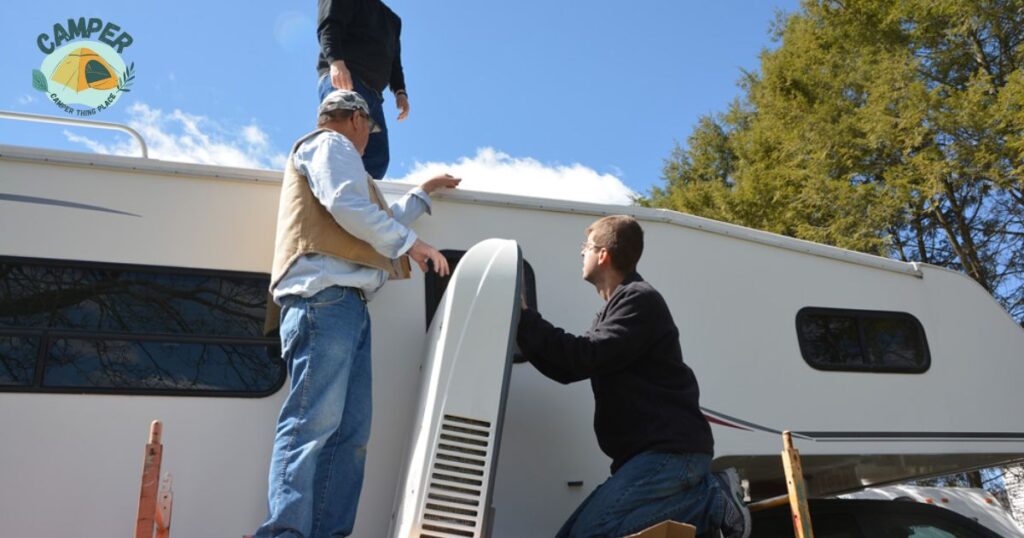
Replacing an RV AC unit involves several factors that contribute to the overall cost. The cost primarily depends on the type and model of the air conditioner you choose for your RV. On average.
A basic rooftop RV AC unit can range from $500 to $1,500, while more advanced models with additional features may cost between $1,500 and $2,500. Labor costs for installation can vary, typically ranging from $200 to $500, depending on the complexity of the job and the technician’s rates.
Keep in mind that these are general estimates, and the final cost may vary based on your specific RV model and any additional components or features you opt for.
It’s advisable to obtain quotes from reputable RV service centers or technicians to get a more accurate assessment of the cost for your particular situation.
Additionally, considering factors like warranty coverage and energy efficiency can impact the initial cost but may offer long-term savings and peace of mind.
How Much Does it Cost to Replace an RV Circuit Breaker?
Here are the factors related to the cost of replacing an RV circuit breaker:
Type and Amperage
- Standard RV circuit breakers typically range from $10 to $50.
- Higher amperage breakers may have higher price points.
Specialty or High-Amperage Breakers
- Specialty or high-amperage breakers might come with higher costs.
Labor Costs
- Hiring a professional technician for replacement may involve additional labor charges.
- Labor costs can vary, averaging between $50 and $150.
RV Specifics
- The specific requirements of your RV, such as its make and model, can impact the overall cost.
Brand and Quality
- Prices may vary based on the brand and quality of the circuit breaker chosen.
Estimates and Quotes
- Obtaining quotes from RV service centers or technicians is recommended for accurate cost assessments.
- These factors collectively contribute to the overall cost of replacing an RV circuit breaker.
Frequently Asked Questions
What do I do if my AC keeps tripping the breaker?
Check for a dirty air filter, ensure proper insulation on the wiring, and consult a professional if the issue persists.
Why does my breaker keep tripping in my RV?
Your RV breaker may trip due to overloaded circuits, a short circuit, or a faulty appliance; investigate each to identify and fix the issue.
Can a bad AC capacitor cause the breaker to trip?
Yes, a faulty AC capacitor can cause the breaker to trip as it may lead to increased electrical stress, causing the system to draw more current than the breaker can handle.
What type of breaker does an RV use?
Yes, a faulty AC capacitor can cause the breaker to trip as it may lead to increased electrical stress, causing the system to draw more current than the breaker can handle.
Where is the breaker box in the RV?
The breaker box in an RV is typically located inside the RV, and it is commonly found near the entrance or in a storage compartment.
Final Thoughts
Addressing a tripping RV AC breaker involves a systematic approach. By checking for overloads, ensuring proper amperage, inspecting wiring, and maintaining components, you can often identify and resolve issues.
Regular cleaning of air filters, examinations of capacitors and compressors, and considering campground power sources are crucial steps. If problems persist, seeking professional help ensures a safe and effective solution. As for the question, how to fix your RV AC breaker when it keeps tripping? We have provided comprehensive answers and solutions throughout this article.
Offering insights to help you troubleshoot and maintain your RV’s air conditioning system. Remember, a well-maintained RV AC system not only enhances your travel comfort but also prevents unexpected interruptions on the road. Stay cool, stay informed, and enjoy your RV adventures without the hassle of frequent breaker trips.

Jackson Ray, a seasoned blogger with a decade of experience, is the creative mind behind “camperthingsplace.com.” Explore his wealth of insights and passion for camping through engaging content on the website.
